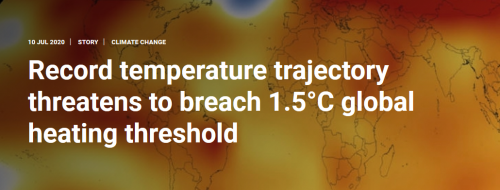
from https://www.unenvironment.org/news-and-stories/story/record-temperature-...
1.5oC is the point where global warming linked consequences become increasingly severe and more difficult and expensive to adapt to, protect ourselves from, and control further temperature increases. Scientifically documented consequences of breaching 1.5oC include 70% loss of corals and loss of half the habitat of insects, including food pollinators, by the end of the century, bringing global food security issues, on top of accelerating frequency and intensity of extreme weather events.
The earth’s average temperature is already over 1.0oC above the pre-industrial period. The Global Annual to Decadal Climate Update, led by the United Kingdom’s Meteorological Office, provides a predictive analysis of the world’s climate for the next five years, updated annually. The last five-year period has been the warmest five years on record. June 2020 was just 0.01°C below the record-breaking temperatures of June 2019, driven by exceptional heat in Arctic Siberia, May 2020 was the hottest May on record.
Warming is fastest in the Arctic and Antarctica

While the smallest temperature change is expected in the tropics and in the mid-latitudes of the Southern Hemisphere, the Arctic is likely to have warmed by more than twice as much as the global mean in 2020 compared to pre-industrial levels (defined as the 1850-1900 average). In Arctic Siberia, average temperatures reached as high as 10°C above normal for both May and June. A record high of 38oC within the Arctic Circle has been recorded at the Verkhoyansk observation station, which has kept temperature records since 1885.
Burning Arctic and Zombie Fires
As the Arctic heats up, wildfires are breaking out in the area. The exceptional heat saps moisture from the ground across the region's boreal forests and tundra, creating perfect conditions for wildfires to burn more intensely and far more destructively. Such dense, peaty soil also offers conditions for so-called “zombie fires”, fires that continue to burn underground and then reignite on the surface after a period, which present serious challenges to controlling them.
The fires have grave consequences because arctic tundra is a carbon sink, meaning that it absorbs a large amount of carbon dioxide and converts it to the carbon compounds that make up its dense vegetative structure. When tundra burns, it releases many magnitudes more carbon emissions than when an ordinary forest burns. It also cannot be restored quickly, as it is an ecosystem that develops over hundreds of years.
In June 2020, an estimated total of 59 megatonnes of CO2 were released into the atmosphere – marking the highest estimated emissions in the 18 years of the Copernicus Atmosphere Monitoring Service (CAMS) dataset.
Implications for the 1.5oC target

“Science is giving us ample advance warning of a global disaster moving directly towards us,” says Niklas Hagelberg, UNEP Climate Change Sub-Coordinator. “And this isn’t new news: records are now being broken almost every consecutive year. What is different this year though, is the experience of living through a global pandemic. COVID-19 is giving us a blunt lesson that we humans depend on the stability of our environment and ecosystems and our success is intertwined with the protection of nature.”
The COVID-19 pandemic has affected and raised questions of every system that drives our societies. In doing so, it presents our greatest opportunity to address climate change. In climate action’s demand for a fair but rapid global transition to an era of clean, renewable energy, this will take a scale of workers and growth matched only by the scale of the need for jobs and economic stimulus today.
For further information, please contact Niklas Hagelberg: Niklas.Hagelberg@un.org











Add new comment